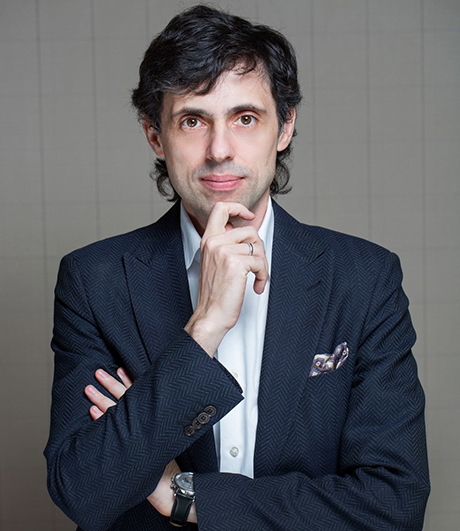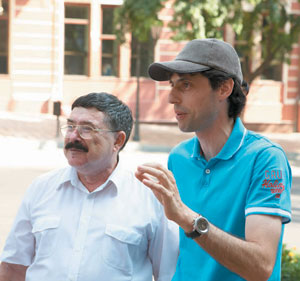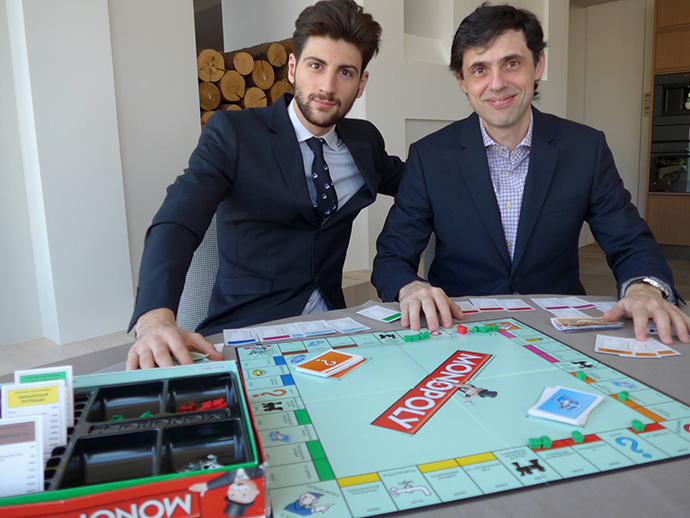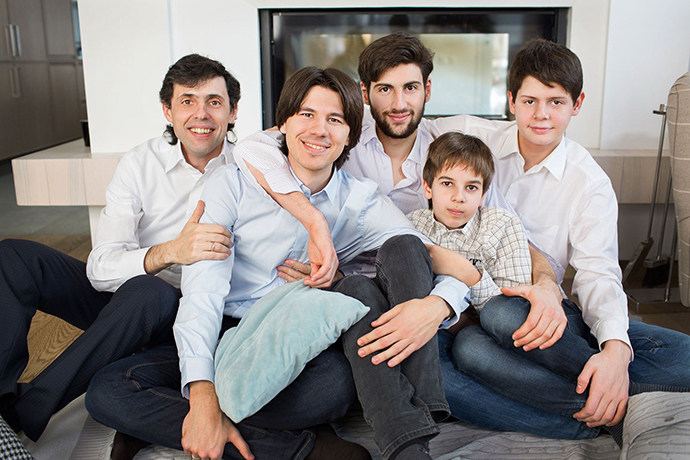Rules of Fatherhood
17.02.2016
In an interview given to Father’s Club Vladislav Burda told about his father, a well-known erudite Boris Burda, about his principles of education and views towards family life.

Father with exceptional abilities
My father – Boris Burda, a multiple winner of the Crystal Owl – the highest award of the game “What? Where? When?” He, roughly speaking from my five, started telling me the books. Some parents read the books for their children; my father retold them for me by heart. But only two or three chapters, just to arouse interest. Then I surely finished reading them – it was necessary to know what happened next. As one would say now, he was doing a “trailer” of each book. When I grew up, he helped me to shape my library.
He has the phenomenal abilities and encyclopedic knowledge. It cannot be transmitted by inheritance. Once I tried to play the brain-ring, but that ended in such a fiasco for me that I would never do it once again. It’s not mine; I do not have such broad erudition, such a body of knowledge and the ability to apply this knowledge at the time when it is needed.
I’ve always been interested in watching all the programs with his participation. I watched all his programs and was proud of him. Being old enough I joined the searching process for a sponsor for him. That was impossible to compete in my father’s domain and to prove myself. His abilities can be found in a single person to 100,000, if not a million. That is why I had to look for my own field.

On the other hand, when you have a very successful and capable father, this is big challenge. You have to refine yourself much more diligently. As the president of the Association of owners of family businesses, I communicate with the entrepreneurs from around the world. I can understand very well the heirs of family businesses who are looking at their parents from the bottom up very. Their parents seem to them very large, and they appear to be very small. In such cases, the great efforts are required to find yourself, to find the own niche and become a person.
School of Life
When evaluating everything done for me by my father, the most important thing, I would say, were my trips with him to the summer camps in Kerch area.
My father was a great activist at the Сlub of Amateur Song (CAS). For several years, his friends organized a vacation at sea; there were almost all adults there, very few children.
In that company, I had to behave like an adult person: cook my own meals, make a fire, take part in the lineups, and be in charge at the kitchen. To be considered as a part of a big family, I had to make commitments and to fulfill them. It was impossible to remain a child there. It was impossible to pretend, as if there were no use demanding anything from me because of my being a child.
Remembering that experience now, I can say that it was the time of my formation as a person. And all that became possible thanks to my father.
He offered me that initiative, gave me a lot of freedom, and I realized that freedom.
I went to the camp for the first time, when I was about 11 or 12; I went there four years in a row. My father was with me there, but he had his own life, I was left to myself. When a child I suffered from asthma, and parents did not know how that trip would affect me. My father took a bunch of drugs then, but it turned out that the Crimean climate was curative for me and the medicines didn’t come useful.
I do not know where else I could show my worth. That was not possible to do in the school. I disliked the idea of going to children’s summer camps. They always had too rigid atmosphere. That was always more interesting for me to be with adults than with my peers.
“I do not owe anything to my sons”
I have four children, all – sons. The eldest is 26 years old, the second – 21, the third – 14 years, and the fourth and youngest – eight years.
How do I motivate the elders? They know that there is none to place them. After their education was paid, I do not owe anything to them any longer. They take the consequences by themselves.
The two eldest sons have finished their studies. Now they are working. Our family has no fare dodgers. They gain experience, but not in my company. For them, it is still too early to work with us. To do this, you need to have sufficient experience and authority, so that not only the parents but the other colleagues as well wanted to work with them. They should be twice better than the average employee in the market. After all, the children of the boss are not very welcome in companies.

It is pretty risky to start career in the parents’ company. I would not recommend this to any family business for one simple reason: if your child cannot cope with his responsibilities, you will have to fire him. It is unacceptable to employ a family member who destroys the family business. The probability that after being fired he might dip into the same water is very small.
Children can be trainees but they should start working really only in an outward company. Then they will get the external experience, go through some trials. So, afterwards, there will be the understanding of their level; you will realize how they can be entrusted with a certain task.
Of course, it would be ideal, if my sons joined my company in the future. I hope that everything will shape well; we will find ourselves in the same boat.
Whence divorces undertake
I have my own theory about why families break up. I came to this theory after 24 years of marriage. Now I am in the third one.
In youth, in the period of unconscious love, any marriage may take place. But when growing up, people move at different speeds. And the change in speed is happening at different times. Just imagine: a guy met a girl while studying at the institute (as it was in my life) but further for each of them the life develops in its own way. Their careers shape differently and the speed of decision-making is also very different. At a certain point, the speed of decision-making becomes critically different, and the marriage breaks up.
There are three parameters, on which one can judge the reliability of marriage. The rate at which the spouses move through the life and the accuracy, they move which. I mean by the accuracy the percentage of correct or wrong decisions, i.e. the decisions, which have negative effects that can be seen immediately. If one partner make nine out of 10 correct decisions, and the other much less, so the marriage will not be kept. After all, one partner will have a high intolerance to the spouse who is in the wrong.
The third important criterion for a good marriage is respect. Each person has a group of people whose opinion he respect and a group of people whose opinion he questions. The spouses must belong to the first group.
If all these three parameters coincide, then the marriage can be considered as sufficiently stable. It is very difficult to save all three parameters. Marriages break up just because some of the elements of this scheme are too cranky.
Main qualities of a good father
First. A good father is a happy one. The children least of all want to see their parents unhappy. Because nothing destroys them more from within than unlucky parents.
What do I mean by the word “happy”? This is a healthy man who fulfilled his potential, is happily married, and realizes what he is doing and how he is wending through his life.
This is a person who understands that his fortune is in his own hands and therefore does not expect any favors either from the society or from the state.
Second. A good father is successful. This does not mean that he is necessarily rich. He can be an artist who is not earning enough, because his talent has not been recognized yet. But he does his job with love and is sure: what he is doing is right. And he likes it. This is already a success.

Third. A good father is a reliable father. A child may not understand the importance of this criterion, but a mother is well aware of it. She needs to know that she can count on her husband.
Fourth. A good father is a broad-minded person with lots of interesting hobbies that can be easily combined with the interests of the family.
On education and heritage
It is hardly to find any one-size-fits-all strategies in the education. There are children who are brought up by nobody and they grow successful, however. There are children who are patronized from an early age but they do not always reach the considerable heights.
In education, the most important things are a personal example, freedom of choice given to a child, a support he receives to get a good education. That will be enough.
I am opposed to the distribution of one’s wealth for charity. Often, such deeds are committed because of the assumption that children will not manage the legacy. A son or a daughter receives a small part of the heritage, and the lion’s share is spent for charity. It turns out that a father does not believe his heir smart enough to run his business.
Remembering my childhood, I can say that the inclinations of a future entrepreneur I had since my seven. At that age, I started to play preference. Besides, I was very fond of playing “Monopoly” and I still play it. I really like all gambling games, I had a category of chess, I love backgammon, checkers, go, I love all board games. Probably, it was the first sign that I would be interested in the competition: how to take my position in the market and how I may benefit.
I was 16 years old in 1988. At that time there was no literature on entrepreneurship. Before I launched a retail business, I had tried 10 different activities. I started from the sale of newspapers and magazines and finished trading tape recorders. Purchase of unnecessary things here, sale of unnecessary things there, and vice versa. For many years I had been engaged in some kind of bizarre experiments before I found a niche and decided to stay in it.
The present school and the education system are not conducive to either forming a healthy individual, or business skills development. The knowledge one can get in school is largely obsolete. A method of this knowledge transmission is not in demand in the modern world. The school has become a tool of parent’s liberation from the necessity to babysit. There is only one positive thing in school: a child has to socialize, to understand their peers and learn how to communicate with them.
And the out-of-school activities contribute to formation of personality: summer and winter camps, informal meetings, participation in forums, events, in which there is an interaction of adults and the younger generation, thus, all the things that are not related to the traditional education system.
About my teachers
The ability to attract teachers is the most important quality of an entrepreneur who wants to grow. Because you hit the ceiling very quickly being unable to move on without teachers.
Among my teachers, there was John Ward, who introduced me to the science of a family business; Joseph Astrakhan – the number one researcher in the field of family business, one of the best specialists in the family genogram construction.
My teacher is Ichak Adizes (Ichak – the spoken form of the name Itshak- eds.), with whom we had very intense six years from 2003 to 2009; one of my teachers is Gregory Reuter, the founder of a very good system for the creation of strategic enterprise planning.
A good teacher is Vladimir Shubin, who taught me how to create a breakthrough technique that I used twice in the company – in 1996 and in 2006. George Manners turned out to be a good teacher for me (he was one of the major MBA professors).
A wonderful teacher is Orenia Yaffe-Yanai, one of the most powerful advisors to spouses who do business together. Long enough, 15 and a half years, I had been worked with my wife in business. I would have had it extremely difficult to do without her business approaches. Antonio Meneghetti was a brilliant teacher. I undertook a few internships by him in different countries and consider his training a good basis for the development of entrepreneurship in life.
Do I want to be like my teachers? Probably not. I cannot say that anyone of the entrepreneurs was my teacher. After all, an entrepreneur has no time to teach, he is trying to thrive on. There is no point in making the attempts to be like them, because at all accounts the point of all doctrines is to find your own way. And the search for the mission makes senseless the desire to be like your teacher.
You can take from entrepreneurs as the subjects to follow, some character traits. For example, Steve Jobs is an example for all of us in how he created new markets. But I do not want to behave like him when speaking of his attitude to the employees or the board of directors.
Currently I am trying to do things, which only few of business practitioners in Ukraine dare: I teach how to integrate different generations into a family business. Time will tell how well I succeed. But I have been very interested so far. And perhaps it will be the basis of my new profession, when the heirs will be ready for business.
//fathersclub.com.ua/burda_vladyslav/




